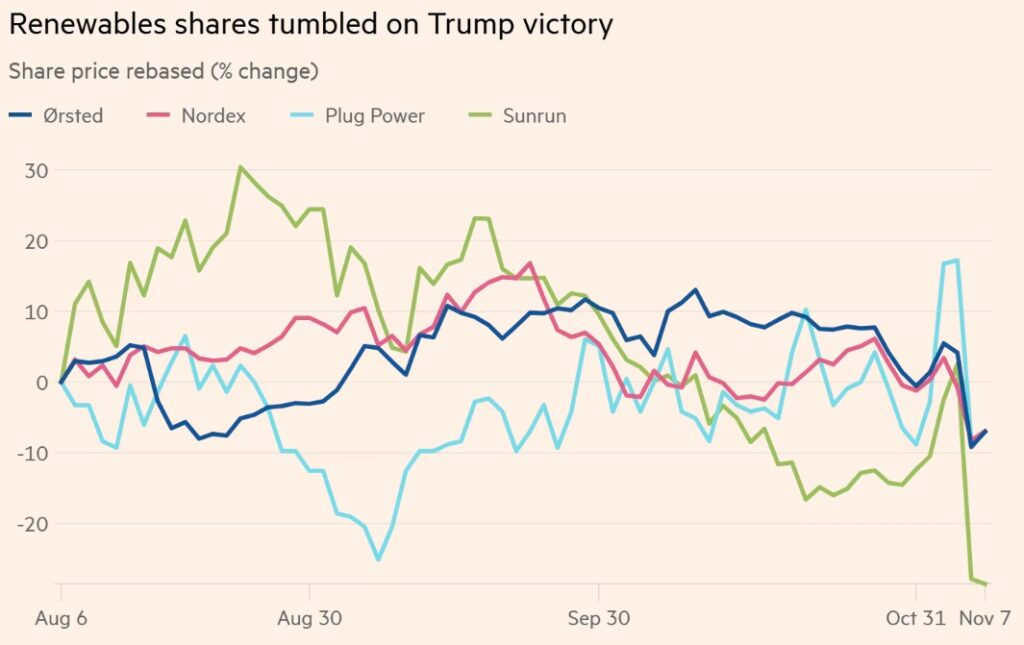 Hedge funds huge profits from undermining renewables
Hedge funds huge profits from undermining renewablesBy John Pickard
Donald Trump is a climate change denier and among other things, in only a few short days his election has undermined the industrial sector linked to renewable energy. According to the Financial Times, hedge funds have made a staggering $1.2bn just by ‘betting’ against shares of these companies.
The hedge funds do this by ‘borrowing’ shares of renewable companies (usually for a fixed period of time), which they sell on at the original, higher share price. When the share price falls, as expected, the hedge fund buys back the same number they sold – now for a much reduced price – to pass them back to company from which they ‘borrowed’ them.
Thus, the hedge fund rakes in as pure profit the difference between the price they sold them and the price they bought them back – and we’re talking millions of shares at a time – less a small cut for the original ‘lender’ of the shares.
This is sometimes called ‘shorting’ and it is used to make money from currencies as well as shares that are predicted to fall in value. Trump has been well-known as a climate skeptic and his election has meant an immediate blow to international renewable companies expected to lose contracts and business. It is one of many ways that rich parasites with money can make more money, without usefully adding anything to society.
Among the companies whose share prices fell on Trump’s election were the Norwegian hydrogen company Nel, and German wind turbine manufacturer Nordex. “Shares in these companies fell sharply on Wednesday”, the Financial Times reported, “amid concerns that the president-elect will “terminate” President Joe Biden’s Inflation Reduction Act, a move that could result in a halt to tax credits and pull the plug on offshore wind development.”

The Hydrogen gas producer, Plug Power, and the solar development company, Sunrun, were also heavily ‘shorted’ by hedge funds, and their share values fell 22 per cent and 30 per cent, respectively. These two US stocks alone made around $350mn profits for hedge funds. “In Europe” the Financial Times continued, “Denmark’s Ørsted, the world’s biggest offshore wind farm developer, fell nearly 13 per cent on Wednesday, while Nordex lost close to 8 per cent”.
The clean energy sector, the FT reports, has been a “popular target” for short sellers. Trump has promised to end offshore wind production in the USA on “day one” of his presidency and halt the rollout of subsidies that featured under Biden’s administration.
Climate change is one of the most serious challenges facing humanity at the present time. There is an undeniable and urgent need to end human reliance on fossil fuels, switch to renewable energy and takes steps to mitigate the worst effects of what in now an inevitable rise in global temperatures. But, as Left Horizons has consistently argued, none of this is possible as long as the ‘market’ is king and important economic and investment decisions are determined by greed and profit.
[Top picture of wind turbines, from Wikimedia Commons, here.]
 Planning and the climate - By Michael Roberts The only way humanity has a chance of avoiding a climate disaster will be through a global plan based on common ownership
Planning and the climate - By Michael Roberts The only way humanity has a chance of avoiding a climate disaster will be through a global plan based on common ownership COP15: the two horsemen of the apocalypse - By Michael Roberts COP15 started this week in Montreal, Canada. This is the UN’s biodiversity summit. In effect, it is an international meeting to discuss
COP15: the two horsemen of the apocalypse - By Michael Roberts COP15 started this week in Montreal, Canada. This is the UN’s biodiversity summit. In effect, it is an international meeting to discuss Twitter welcomes back thousands of Nazis - By John Pickard While the UK government is putting through parliament a rather tame bill to oblige social media companies to protect children who go
Twitter welcomes back thousands of Nazis - By John Pickard While the UK government is putting through parliament a rather tame bill to oblige social media companies to protect children who go Kohei Saito: the metabolic rift and de-growth communism - By Michael Roberts Kohei Saito is an associate professor at Tokyo University and an erudite Marxist scholar. Not a candidate for a best-seller in the
Kohei Saito: the metabolic rift and de-growth communism - By Michael Roberts Kohei Saito is an associate professor at Tokyo University and an erudite Marxist scholar. Not a candidate for a best-seller in the Another cop out? - By Michael Roberts COP 27 started over the weekend. COP stands for the conference of the parties under the UNFCCC. Under the 1992 UN framework
Another cop out? - By Michael Roberts COP 27 started over the weekend. COP stands for the conference of the parties under the UNFCCC. Under the 1992 UN framework

